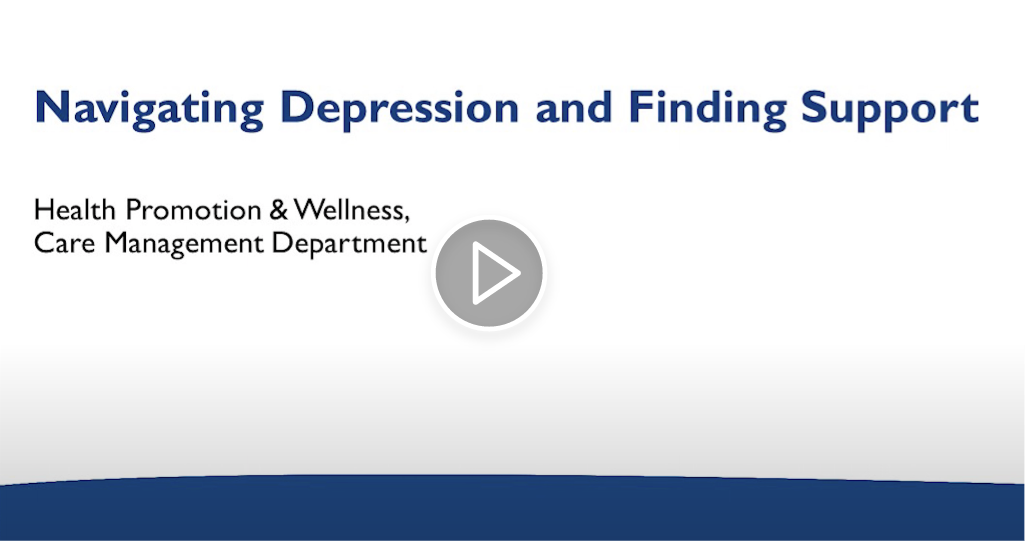Mental Health SUpport
Take a step towards mental wellness.

The help you need and deserve is one call away.
Mental health (or behavioral health) is as real and important as physical health. They are connected, so the health of your body depends on your mental well-being. Getting help for a mental condition isn’t a sign of weakness, but rather an act of strength to take control of your health.
Symptoms of Behavioral Health Conditions
If you or a loved one needs help, how do you recognize the problem? These are some of the common symptoms of behavioral health conditions:
- Decreased participation in activities or involvement with people
- Struggling to cope with job-related activities, everyday problems or daily household tasks
- Unexpected or abrupt mood swings, from joyful highs to gloomy lows
- Frequent thoughts about suicide or causing injury other people
- Recurring disruptive thoughts or memories
- Regular or increasing misuse of alcohol or drugs
- Behavior that is angry or prone to violent outbursts
- Feeling hopeless or a sense of overwhelming helplessness or deep sadness
- Imagining voices that aren’t there or believing things that aren’t true
- Developing an actual plan to commit suicide
These symptoms are warning signs that help is needed. If you or someone you care about is experiencing any of these symptoms, seeking early treatment is essential to successful care and management.

Take the first step.
Getting help for a mental condition is an act of strength to take control of your health.
Do you need Help NOW? If you think you might hurt yourself or someone else, text or call 988.
UNDERSTANDING MENTAL HEALTH
Common Conditions
Mental health conditions may be passed down through the family, or they can occur because of abnormal brain chemistry, substance abuse, or in response to traumatic events or an abusive environment. In other words, a mental illness isn’t the fault of the person who’s suffering. A broad range of behavioral health conditions are shared by many people, though for different reasons and in differing degrees. Here are some common behavioral health conditions:
- Grief and loss
- Eating disorders
- Depression
- Stress and anxiety
- Bipolar Disorder
- Obsessive-Compulsive Disorder
- ADD-ADHD
- Autism

Where to Start
Finding help starts with understanding where to begin. There are many people and places that can equip you with the right resources.
Your health care provider
One of your best resources to consult early, your health care provider knows you and is more likely to notice any changes in your mood or personality. They will be able to examine you and rule out any possible physical issues for your symptoms.
Community mental health centers
These organizations give counseling and other services on a sliding-fee scale, based on your income.
Crisis centers
On-site mental health professionals can provide immediate evaluation and treatment.
Support and self-help groups
Alcoholics Anonymous and the National Alliance on Mental Illness are examples of peer and family support groups that meet both online and in person.
Emergencies
If you are in an immediate state of crisis, call 9-1-1 or go directly to a hospital emergency room for urgent attention. Attending health care providers will also be able to tell you where and how to get more help.
If you experience feelings that cause you to believe you may hurt yourself or someone else, get help right away. Call the National Suicide Prevention Hotline at 800-SUICIDE (800-784-2433) or your local crisis center. For Maryland: call or text 988.
Mental Health Providers
Psychiatrists or medical healthcare providers
These professionals can give counseling and medicine.
Psychologists
These professionals have doctorate degrees. They specialize in psychotherapy and human behavior.
Mental health nurse practitioners
These professionals have advanced degrees. They can give counseling and medicine.
Licensed clinical social workers (LCSW)
These are professionals with a master’s degree who are trained in one-on-one and group psychotherapy. They help people deal with a variety of mental health and daily living problems.
UpLift Virtual Behavioral Health Program
Get timely, personalized care for behavioral health concerns through a greatly expanded network and rapid scheduling, matching individual needs with a qualified clinician, often as soon as the next day. Visit UpLift.
Find a mental health provider:
Search the provider network using the Provider Directory.
Gun Violence: A Public Health Crisis
For the second consecutive year, the Centers for Disease Control and Prevention (CDC) reported the highest number of gun-related deaths on record. The Johns Hopkins Center for Gun Violence Solutions is working to reduce gun deaths and provide support for those affected.
The Johns Hopkins Center for Gun Violence Solutions is working to reduce gun deaths and provide support for those affected.
Take the first step.
If gun violence has impacted you or a loved one, and it’s affecting mental health, we encourage you to use our mental health resources for support.
*You can opt out of Care Management services at any time by contacting us at 800-557-6916 or caremanagement@jhhp.org.

